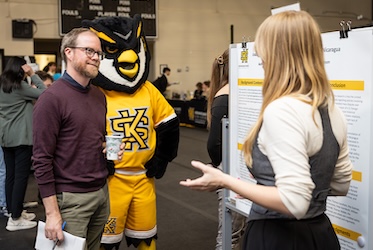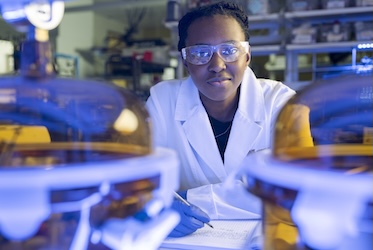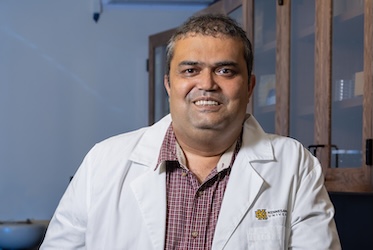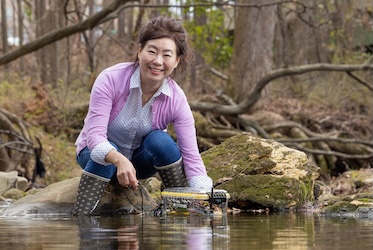
Kennesaw State paper sheds light on biodiversity amid climate change
KENNESAW, Ga. | Mar 20, 2023

According to Whitney Preisser, assistant professor of biology, the decrease in parasites is likely a result of changes in the water temperature. These changes hint at a potential ecological threat which could impact all species. Her findings were recently published in the Proceedings of the National Academy of the Sciences.
“If the parasites die off, then we might see impacts to the free-living species, the ones most people want to keep around, as well,” Preisser said. “This paper hopefully draws attention to an urgent environmental issue.”
Preisser, whose specialties are parasitology and disease ecology, began her work as a postdoctoral scholar at the University of Washington. When she joined the KSU College of Science and Mathematics faculty in August 2022, she continued her research by tapping into the work of Professor Emeritus Bill Ensign. Between the 1990s and 2016, Ensign took more than 2,000 specimens out of streams and creeks primarily in Cobb and Paulding counties for research purposes. Preisser is now examining them for further study of parasites specific to local waterways. The collection spans more than 115 species of fish, offering a glimpse into the waterways’ health.
“This study will be bigger than the one I did in Washington, and it will involve freshwater fish, which have slightly different stressors than saltwater fish,” she said. “I’m looking at how urbanization, changes in water temperature, and pollution are impacting the parasites of these freshwater fish in Georgia.”

In addition to continuing the study of parasites in Georgia waterways, she has a similar project in mind using road-killed animals, such as deer, coyotes, foxes and squirrels. She said the parasites found in those mammals can tell us about the health of the environment, because animals reflect their ecosystems.
“I want people to recognize the importance of parasites,” she said. “Even though they may cause some harm to individual animals, their overall effect can be good for the ecosystem. They help control populations, they help drive species biodiversity and they help cycle nutrients.”
Along with her study of parasites in fish and roadkill, she teaches classes in parasitology and ecology in the Department of Ecology, Evolution, and Organismal Biology, and hopes to attract both undergraduate and graduate researchers interested in parasitology.
“I feel like Kennesaw State equally values research and teaching,” she said. “I’m happy to be here because I can have the best of all worlds in that way.”
— By Dave Shelles
Photos by Darnell Wilburn
Related Stories

Kennesaw State students to present research at Symposium of Student Scholars

Chemistry student engaged in sustainable catalyst research through Kennesaw State's First-Year Scholars program

Kennesaw State researchers awarded Department of Energy grant to investigate materials that boost energy-efficient technologies

KSU researcher designing AI system to transform water safety
A leader in innovative teaching and learning, Kennesaw State University offers undergraduate, graduate, and doctoral degrees to its more than 47,000 students. Kennesaw State is a member of the University System of Georgia with 11 academic colleges. The university’s vibrant campus culture, diverse population, strong global ties, and entrepreneurial spirit draw students from throughout the country and the world. Kennesaw State is a Carnegie-designated doctoral research institution (R2), placing it among an elite group of only 8 percent of U.S. colleges and universities with an R1 or R2 status. For more information, visit kennesaw.edu.














